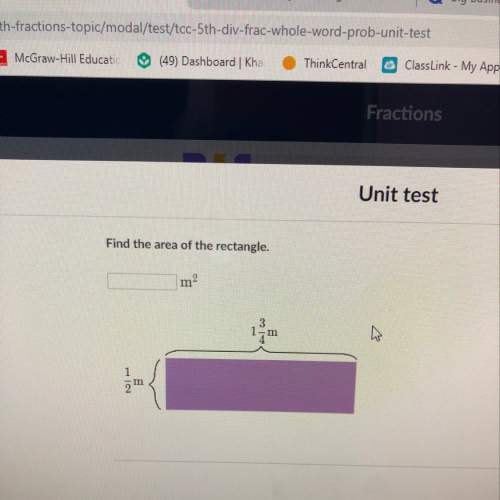
Mathematics, 21.01.2020 01:31 ghetauto
F(x) = b^x and g(x) = log b x are inverse functions. explain why each of the following are true.
1. a translation of function f is f1(x) = b^(x-h). it is equivalent to a vertical stretch or vertical compression of function f.
2. the inverse of f1(x) = b^(x-h) is not equivalent to a translation of g.
3. the inverse of f1 (x) =b^(x-h) is not equivalent to a vertical stretch or vertical compression of g.
4. the function h(x) = log c x is a vertical stretch or compression of g or of its reflection -g. read this as"negative g"
will probably needs to use the properties of exponents and logarithms and change of base formulas to change the functions into alternate forms

Answers: 1


Other questions on the subject: Mathematics

Mathematics, 21.06.2019 18:50, beeboppity
7. the area of the playing surface at the olympic stadium in beijing isof a hectare. what area will it occupy on a plan drawn to a scaleof 1: 500?
Answers: 3

Mathematics, 21.06.2019 20:00, martinezjulio1976
Use the elimination method to solve the systems of equations. choose the correct ordered pair. 7x+4y=39
Answers: 1

Mathematics, 21.06.2019 21:30, vaelriacb5317
Is triangle jkl congruent to triangle rst? if so, what is the scale factor?
Answers: 1

Mathematics, 21.06.2019 22:30, cordobamariana07
The difference of three and the reciprocal of a number is equal to the quotient of 20 and the number. find the number.
Answers: 2
You know the right answer?
F(x) = b^x and g(x) = log b x are inverse functions. explain why each of the following are true.
Questions in other subjects:

History, 22.09.2019 08:30

Mathematics, 22.09.2019 08:30


Business, 22.09.2019 08:30


Mathematics, 22.09.2019 08:30




 . It is equivalent to a vertical stretch or vertical compression of function f.
. It is equivalent to a vertical stretch or vertical compression of function f.


 then it will be a vertical stretch.
then it will be a vertical stretch. then it will be a vertical stretch.
then it will be a vertical stretch.

 to the other side of the equation so we get:
to the other side of the equation so we get:






 is a vertical stretch or compression of g or of its reflection -g.
is a vertical stretch or compression of g or of its reflection -g.

 it will be a vertical compression of g(x). If
it will be a vertical compression of g(x). If  , then it will be a vertical stretch no matter if g is positive or negative.
, then it will be a vertical stretch no matter if g is positive or negative.



